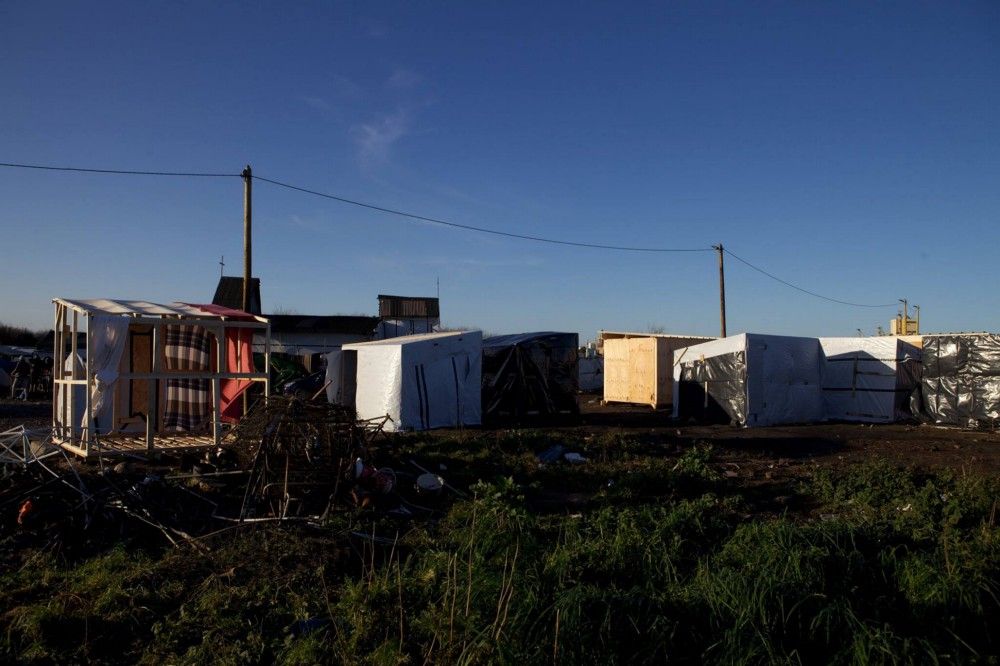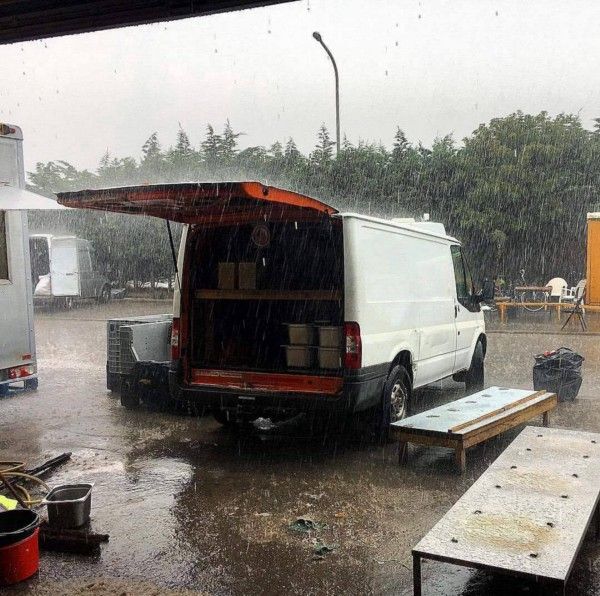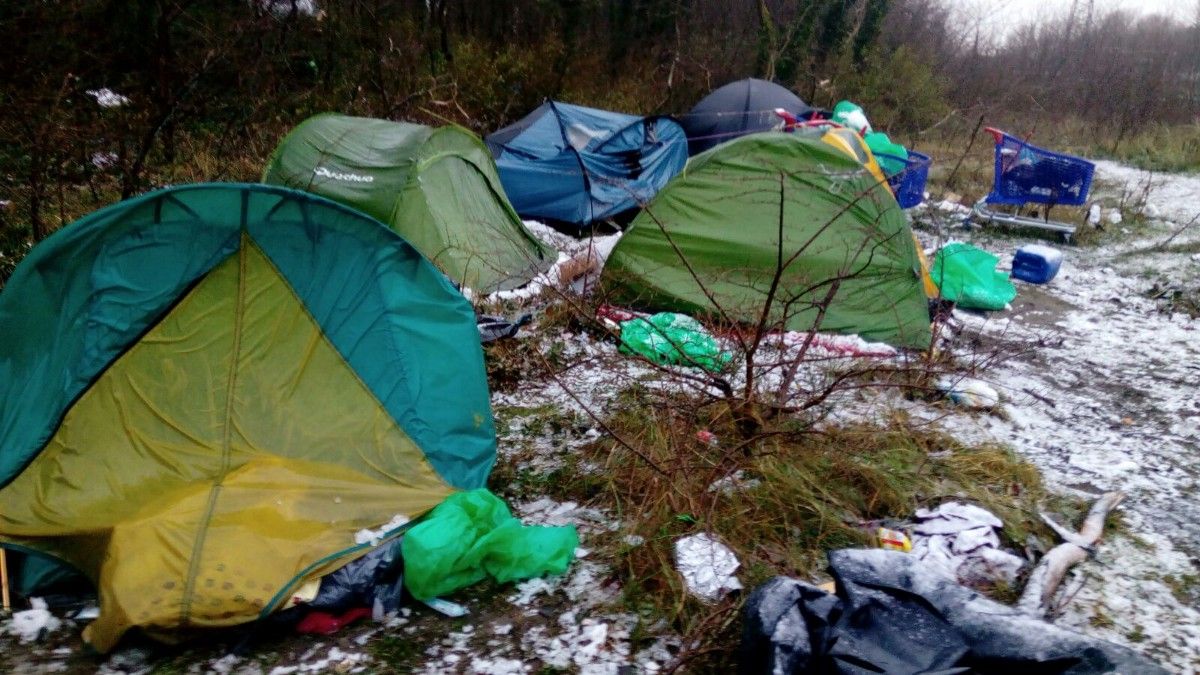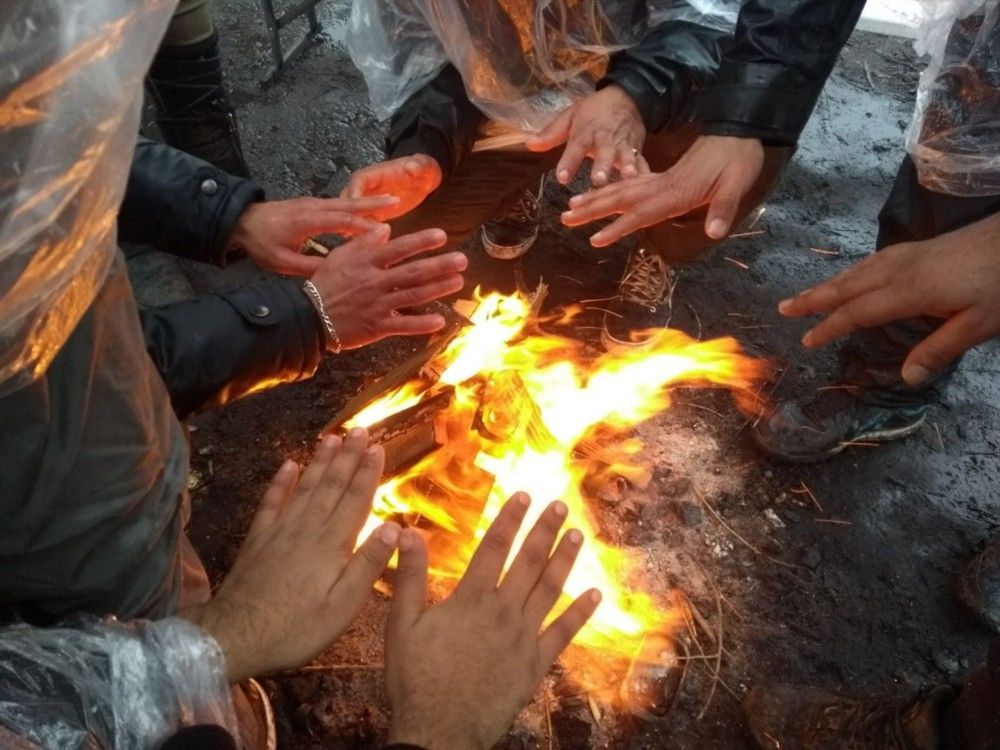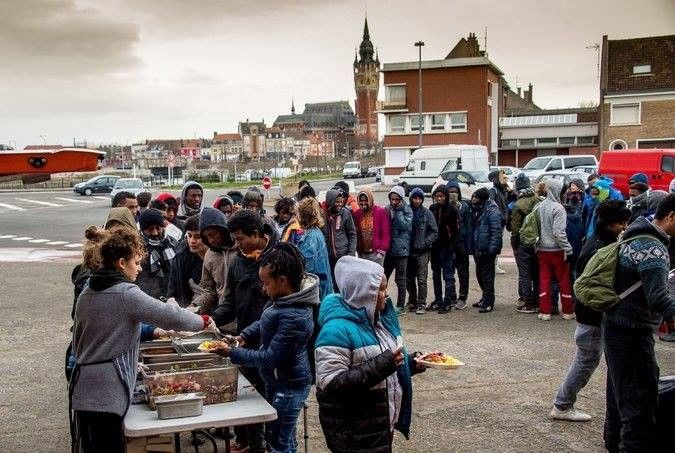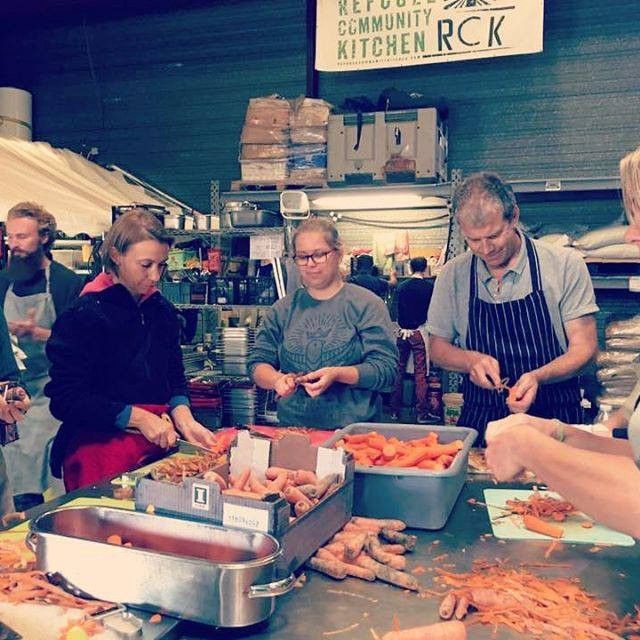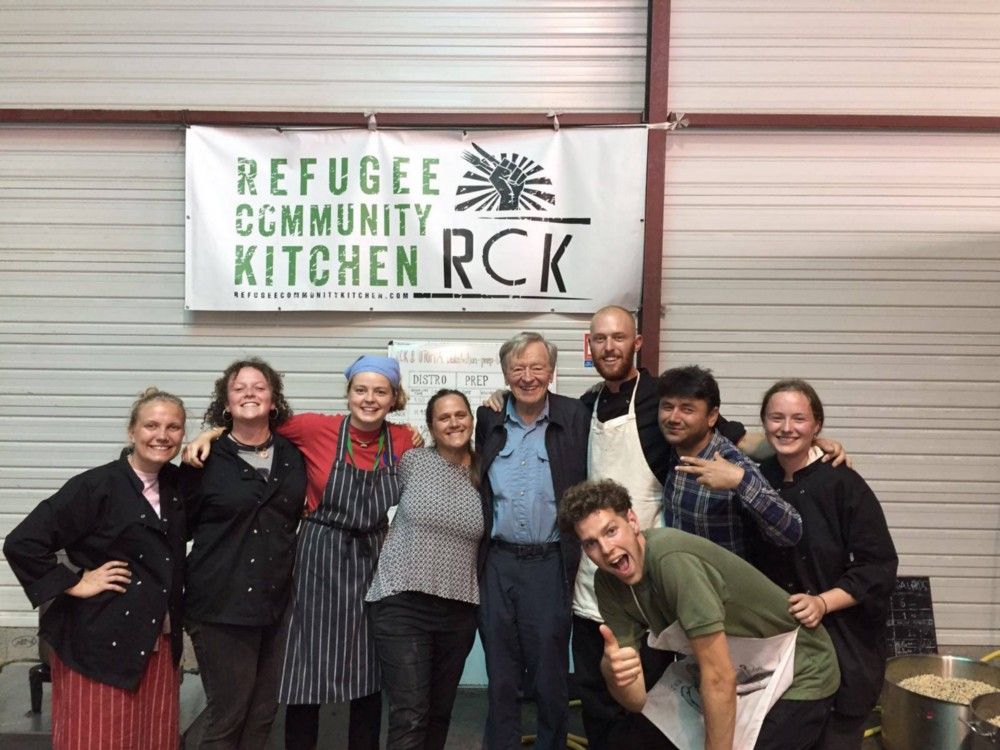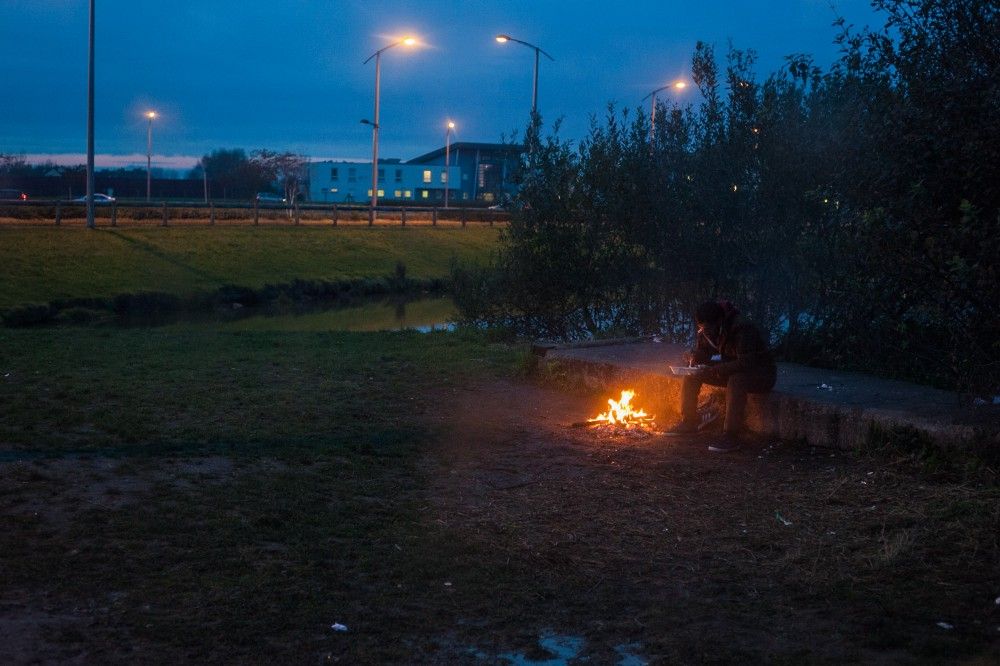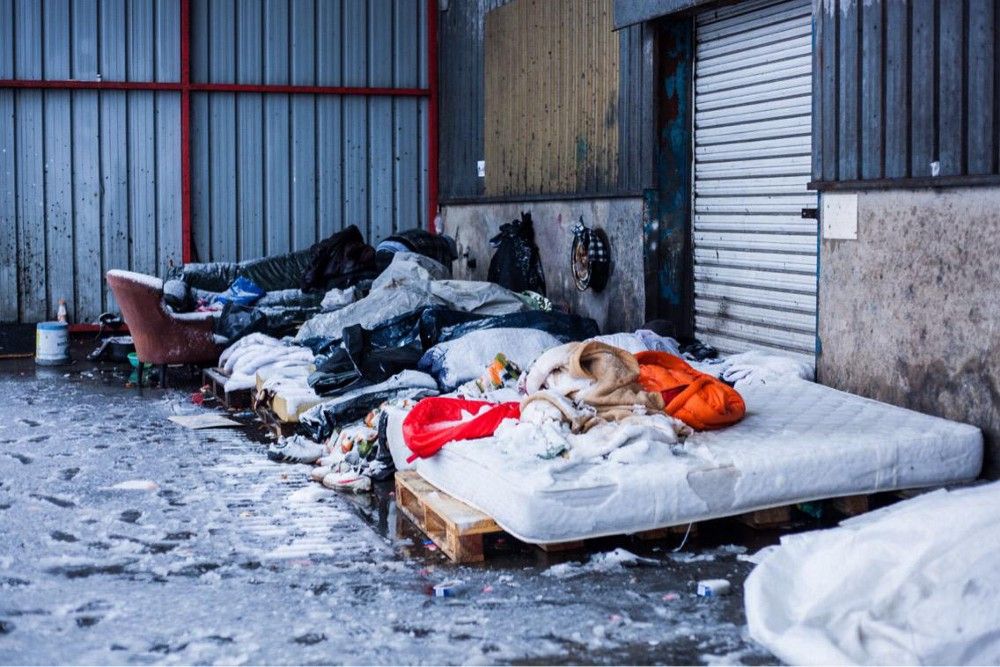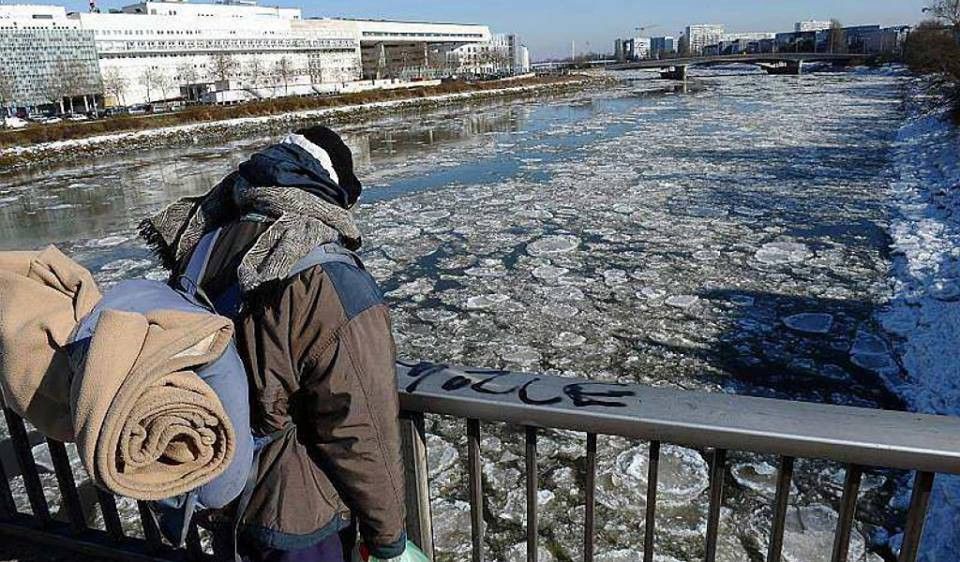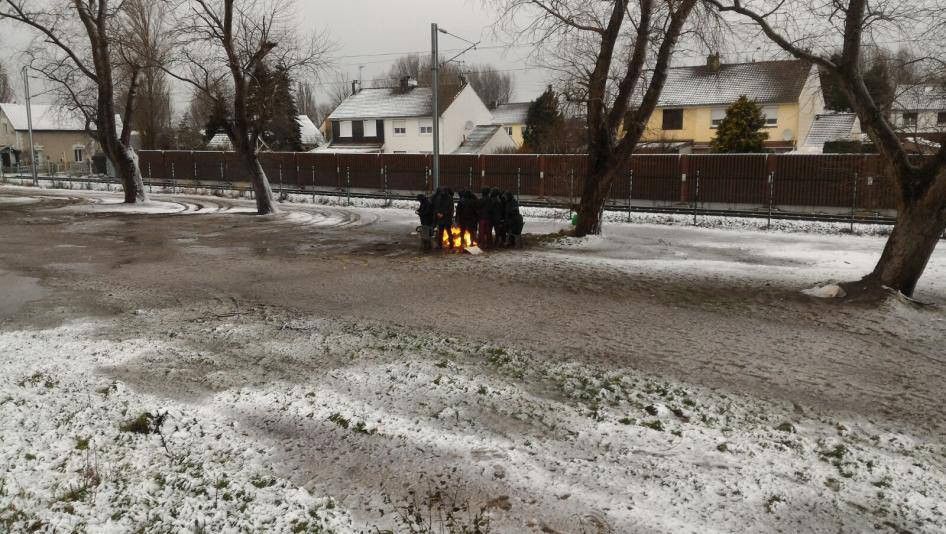The van of volunteers from the organization Help Refugees/L’Auberge des Migrants pulls up between two transmission towers in an empty lot not far from the previously destroyed encampment referred to as “The Jungle” in Calais, France. This is one of the places in and around town where refugees are toughing it out (“living hard” is the what we see written in the memos posted on the walls in the warehouse where we volunteer). It’s winter now, and the weather vacillates between mildly horrible and truly abysmal. On a good day, the sun peeks through the low, fast-moving clouds coming off the English Channel, and in December the temperature reaches 45 or 50 F (7 or 10 C). On a bad day, biting rain sheets in horizontally, the temperature is 35–40F (4–7C), or colder, and with snow and ice. There are many more bad days than good.
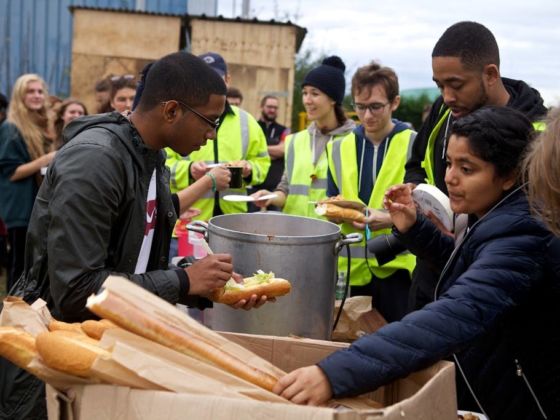

I had volunteered in a warmer time, June of 2016, when the real Jungle was in existence, with estimates of 6500 to 7500 people living there, and over 100 new arrivals every day. I had helped with daily clothing distribution as well as the evening “welcome” caravan, a chance to give out tents, sleeping bags, and hygiene kits. As horrible as the conditions were in the Jungle, what is occurring now in Calais makes one yearn for the good old days. Although the level of potential physical comfort was minimal, it was at least minimal – instead of completely non-existent. There were “streets,” there were actual businesses, there were mosques, there was an Eritrean church. There was a little school “Jungle Books,” and – most important – a youth center for unaccompanied minors to have some downtime from daily struggles, with food, games, some teachers. Doctors Without Borders came once a week, there was a medical caravan always with staff. There was an information bus where the refugees could recharge their phones, receive donated sim cards, and get legal help with their applications for asylum or attempts to get to the UK. There was a special caravan for women to have “spa day” and do their hair and nails, be away from the hordes of single men in the camp. The Jungle was horrible – but in retrospect, it was like a resort in comparison to the conditions you find in Calais today, in January 2018.
Today, out past the muddy lot to the left are bushes, then leafless woods. When the van pulls, in figures emerge in the rain and approach us; mostly young, single men – two or three women, a few young boys — dressed in all manner of donated clothing, all dark colored, which they prefer so as not be spotted at night if they try to hide inside a lorry — or riskier, try clinging like a bug underneath. They want to cross on the ferry and enter the UK, the magical land they are so certain will take them in, where they have been told there is the possibility of jobs, and most of all, certain safety. While I was in Calais this time, one young Afghan man was hit and killed on the highway that leads to the ferry across the Channel, and 4 days later another was hospitalized in critical condition. The trucks did not stop after hitting them.
Today, the shelters in Calais are only open if the temperature is 32F or below. This new policy is called “le grand froid” – the big chill. The refugees must arrive via local police van, they can’t walk in, they can’t be driven by volunteers, or by anyone else. This requirement causes so much fear of possible deception and deportation that many forego the assurance of warmth for the night. If they do go, they are provided with a number which corresponds to a tent space on the floor, with sleeping bags already laid out inside. Every morning they must leave and then re-enter once it has been ascertained that the temperature will be low again the next day and evening. They are then re-assigned another number, another tent and sleeping bag. This is not the most sanitary way to warehouse people, as illnesses, bedbugs, scabies, etc. can be easily transmitted. Sometimes when it seems there will be a stretch of cold weather they are told they will be able to stay, and they leave for the day intending to return in the afternoon. While they are gone, sometimes the decision is made to close the shelter that night and their meager belongings are thrown out without the possibility of reclaiming them. Yes, here in France, home of Liberty, Equality, Fraternity. (If you would like to voice your displeasure with this situation, you can address comments to Monsieur le Prefet, at pref-communication@pas-de-calais.gouv.fr )
There are sometimes tents back there in the bushes. Tents are considered “permanent structures” and are disallowed by the local government. When the French police find them, they are confiscated and destroyed. Sometimes the local gendarmes have a bit of fun and slash the sleeping bags too, rendering them useless against the cold. Sometimes they pepper-spray migrants for no reason. While I was volunteering, one of the other distribution crew told me that the night before while she was setting up at another location near the ocean, several men showed up shivering, in wet clothes and barefoot. They had been herded like sheep to the water’s edge and told that their choice was to jump into the freezing water or be deported immediately. They jumped. The van went back to the L’Auberge de Migrants warehouse to gather more clothing, thus depleting the amount saved for the regularly scheduled clothing distribution another day, but this was an emergency. Every time the tents and sleeping bags are taken or ruined, they are replaced from whatever donations have been culled and deemed useful.
The men usually have a fire going near the small van that sometimes comes from another volunteer organization, so they can charge their cell phones and call home, wherever home may be. Sudan, Eritrea, Afghanistan, Syria, Iraq, Iran, Bangladesh. They burn anything they can get their hands on; cardboard, food containers, green branches from the bushes, old clothing. Often the fumes of flaming plastic fill the air. Gusts of wind blow showers of sparks everywhere, and rain extinguishes the flames.
Food distribution teams from the Refugee Community Kitchen are comprised of seven volunteers. Two people for each of the two food tables. One person serves at the tea table. A team leader is a “runner” to replace the deep rectangular metal warming pans as they empty. Another leader is responsible for crowd control to keep the lines moving while simultaneously handing out the small cardboard food trays. Lunch is a soup or thick porridge, plain bread and/or garlic or cheese bread. Tea is hot, strong, sweet, and plentiful. Sometimes there are oranges or bananas if any were donated that week. Dinner consists of rice, a hearty curry of beans or lentils, salad, and bread. They like bread – it fills them up, it sops up the gravy, they need calories and warmth to make it until the next meal or the next day. There is a lot for them to manage in two hands – a container of tea, a plate heaped with food and bread balanced on top. If they indicate a free pocket, I put in the orange.
Food distribution usually proceeds smoothly. Occasionally scuffles break out, someone jumping line, or perhaps some animosity from before we arrived boils over into shoving or yelling. Other times, volunteers come back with joyful stories of everyone dancing together around the fire (the van cranks up the music really loud to attempt some air of festivity.) After we clean up the trash we are encouraged to mingle if the men want to talk to us.
Before leaving the warehouse, we are advised not to ask certain questions which might trigger more sadness and despair about their plight. “Don’t ask where they are from, don’t ask how they got there, don’t ask how long they have been there, don’t ask about their families, don’t ask where they hope to go, don’t ask what their work used to be, unless they ask you first, then you can turn the question back to them.” Upon learning that I am 60 years old, one African man asked if these were my original teeth, and complimented me when I answered in the affirmative. Another man asked me my name and found that it’s the same as his mother’s. “Then you are like my mother here with me!” he said, and hugged me.
L’Auberge des Migrants operates out of a huge warehouse in an industrial area east of old Pas de Calais. The location is mostly secret. Not completely, though, as it’s been performing the impossible for too many years now to be invisible or unknown to the residents of Calais. Volunteers come from all over Europe, and some from the US and Canada, to chop vegetables, mix salad, sort clothing, repair tents, check blankets, wash pots and pans… Some are in college, some are those citizens-of-the-world types who bloom no matter where they’re planted, some hop over from England, Ireland, Scotland, etc., whenever they feel called, for a weekend, or some for longer weeks during a holiday from work. Some are traveling in Europe already and make it a stop during their global galavanting, some come from even farther because it seems that chopping carrots may be all they can do to help. It’s astounding.
The volunteers’ average age is probably around 24 years old, and this includes the long-term folks who stay from one or two months to a year. Kitchen supervisors who dole out tasks, organize distribution teams, convene meetings and debriefings, are incredibly mature, compassionate, and worldly young people. My last shift, the night before I headed back to the States, a woman led us through what felt like a war as we served dinner in 35-mph winds and driving rain at the Grande-Synthe preserve in Dunkirk, then drove us all soaking wet and freezing to the shelter in town that houses 200 men, women, and children. The physical discomfort at Grande-Synthe and then the emotional drama of a mob scene around the tea table in the shelter was a hard combination to comprehend. Our leader calmly handled the weather, the order of tasks, and every decision needed, including checking in on her crew to make sure we were alright. Her birthday had been the day before. She was barely 20 years old.
I had already been in the rain and cold earlier that day during lunch at the abandoned lot location. After loading up the leftovers and doing a trash pick-up, we were ready to return to the van. A man was leaning against the side door, his head against the cold metal, crying. The head of our team, an Irish girl with long blonde hair and a swipe of mascara on her pretty eyes put her arm on his shoulder. “Be strong, my friend,” she said. (“My friend” is the universal equalizer, the refugees say it when they shake your hand, no matter what country they are from, we use it to show respect, and sometimes to defuse mounting tension or frustration.) “Be strong for just another day.” She is 22, and precociously kind. They all are.
I walked back and forth to the warehouse from the home of a local woman who rents beds on her floor to volunteers, 14 at a time. I slept in a room with 5 others, and the whole household shared one bathroom and one kitchen for 10E/ night. It was glorious. Mostly younger, a few older, but all friendly, all there for the same reason. As I walked my route twice a day, I wondered where I would hunker down if I was seeking refuge. That looks like a good hedge, you could definitely burrow in and not be seen if you were careful. Sure enough, peering closely, I would see a piece of corrugated metal woven between branches to provide some shelter from the rain. There were remnants of a small fire. I scanned fields for low depressions to make a nest. I looked under highway bridges for pillars broad enough to hide behind. I walked by a tall fence topped by barbed wire surrounding the perimeter of an abandoned building. Set far back from the road, there was an overhanging roof jutting out. It was open air on three sides, but the roof would hold back the rain and snow. The next night I saw a flickering flame back there and silhouettes of people sitting around it.
Every night in the hedges across from the warehouse there were two separated groups of African men sitting around small fires. I started going over to say hello, to shake hands and let them know I knew they were there. I did this deliberately in attempt to atone for what I had done after my second work day. A man had approached me and two of my housemates. He was trying to ask me something, and I defaulted to the usual response to street people who accost me in the States. I said, “I’m sorry, I can’t help you,” and walked on, still gabbing with my new young friends. We got back to the house and one of them said, “I don’t mean to criticize, but I just want to ask you if that’s the protocol here. I mean, aren’t we here working every moment to help them in general, and then one individual came up and you blew him off. Is that what we’re SUPPOSED to do?”
I realized that I had gone on automatic pilot and not bothered to listen. Maybe he wanted to give me some money to buy something at the store which doesn’t want the refugees to enter. Maybe he was asking to borrow a lighter for his cigarette. Maybe he truly wanted something I couldn’t provide. I didn’t try to find out. The next day I asked administrator personnel how we were supposed to be interacting with folks on the street. Is there a “right” and “wrong” way to be here? I started crying, ashamed at how obtuse I had been. A sweet, 25-year-old organizer from Italy hugged me and told me it was ok, that chances are there wasn’t anything I could have provided this guy, but that they are people in a shitty situation. “Remember, this is not like back home. Just listen, find out, if you want to give a cigarette or water, or whatever, you can do whatever you think feels right. Don’t give things from the warehouse, we can only distribute at certain locations and can’t have anyone assume they can come to the gates and ask for things, but it’s up to you any place else.” From then on I talked on the street to anyone who wanted to say hello, I looked them in the eyes, I made sure they knew that I knew they were there. I realized there’s no reason for me to behave any differently at home as well.
How to serve food to a refugee. You make eye contact, and say, “Hello! How are you? It’s so good to see you again. Would you like some rice? More? Some curry? Is this enough? Salad? Careful for your hands, the tea is hot! What a beautiful smile you have.
You are welcome.
I am with you.
Stay warm tonight, my friend.”
This article originally appeared on Medium and is republished here with permission.
